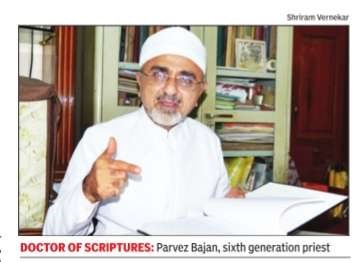Rustom House in Grant Road is home to an elderly priest who is a veritable storehouse of Iranian history . Ervad Parvez Bajan has six cupboards for books on Irani and Persian culture and just one for his personal effects. He can pick out unerringly the volume in the vast cache which contains a particular detail he is seeking.
Article by Bella Jaisinghani | Times of India
His earnestness has served him well. At age 65, Parvez Bajan has earned a doctorate in a rare subject, Avesta-Pahlavi, the language of the Zoroastrian scriptures. His guide was Dasturji Dr Kaikhushroo JamaspAsa, an acclaimed scholar of international repute. Barely a handful of priests have taken a doctorate in this subject before, and a proud Bajan has requisitioned new visiting cards that qualify his name with his new degree.

He carefully extracts the original text which has earned him his doctorate. It reportedly dates back 450 years, so the leaves must be handled with extreme care.Curiously , it is written in a mix of Avesta, Pahlavi and old Gujarati in a manner that requires one to turn the book upside down to decipher each alternating script. “It tells the story of a little boy who asks his father to explain the significance of tying the `kusti’ (sacred thread) during the thread ceremony or Navjote,“ Bajan says. “Pahlavi is a complex script with 14 characters in the alphabet and no punctuation, so one must decipher the letters and the meaning.“
Most ancient Iranian languages like Avestan, Pahlavi and Pazand are not spoken tongues anymore, he says, yet community youngsters show interest in studying them at Mumbai University .“We are witnessing renewed interest in Zoroastrian history as well. Each year Noshir Dadrawala and I conduct tours to Iran on behalf of a Pune institute, where we guide Indians and expats through the holy sites of the faith. The warm feedback we receive is a sign that we are on the right track,“ he says.
His own son who studied at St Mary’s ICSE, Mazgaon, holds a corporate job, yet is committed to wearing the priestly mantle when the need arises.








